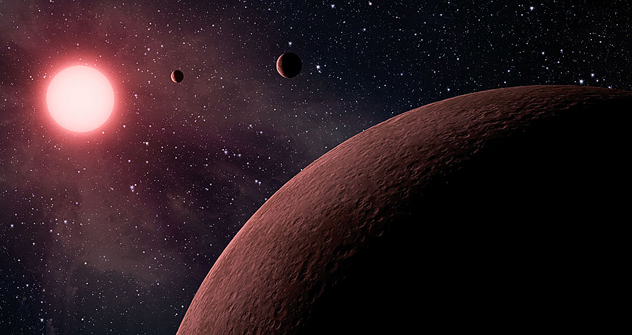Star Wars or Star Peace?

At the moment the sky is home to around 500 American orbiters, and just 100 Russian ones. Source: Nasa/Press Photo
Two new military satellites, one American, the other Russian, were recently launched into orbit. There is nothing particularly newsworthy about this since different satellites are constantly being sent up into space, but still, the event is yet another indication that space is becoming more militarised. If we are to prevent space from turning into a new kind of warzone, it is essential that international agreements to ban space armaments are developed and signed as a matter of urgency.
Back in 1977, no one would ever have believed George Lucas’s Star Wars Trilogy could become a reality. But today, 35 years after the film was first released, there is apparently a greater possibility of a space battle happening outside the realm of Hollywood fantasy. Space has become a central part of the military and defence policies in many of the world’s biggest states.
In the future a country at war will not try to occupy enemy territory directly. Instead it will concentrate on finding a country’s weak spots before issuing calculated blows. Ground troops and armoured vehicles will soon become a thing of the past, and strategic aviation is also set to take a back seat in the military campaigns of the future. Our understanding of ‘strategic armament’ has shifted from classic ‘nuclear defence triads’ towards non-nuclear armaments which rely on high-precision weapons systems and various means of deployment.
Wars of the future are expected to involve a lot of orbiters to ensure a country’s security: satellite reconnaissance, warning, forecasting and targeting systems – objects which themselves will need to be defended and armed.
The US is making huge investments into satellite technology. Back in 2009 US Defence Minister Robert Gates convinced Congress to designate a sum of $10.7 billion to developing this field. His successor in Barack Obama’s administration, Leon Panetta, clearly has no intention of lowering this sum.
Authoritative military analysts like for example, General Vladimir Slipchenko (who recently passed away), predict that by 2020 the world’s leading countries will have between 70,000-90,000 precision weapons. We can only imagine the number of satellite systems these will require. And without satellites, the cruise missiles and smart bombs that can be programmed to wipe out something as small as a mosquito are no more than useless lumps of metal.
And so it is only a matter of time before orbital systems are developed that will be able to independently hit targets in space, in the atmosphere or on the Earth itself. But just because the technology exists (or soon will do) it does not make it necessary to send military space stations into orbit, and this certainly should not mean that reconnaissance or meteorological satellites should have to be armed. In reality, the problems of satellite defence could be effectively dealt with from Earth.
“Whoever owns space also owns the world,” says the former Chief of Arms of the Russian Armed Forces, Colonel-General Anatoly Sitnov. But people in the military are the first to admit that Russia is lagging far behind the USA when it comes to space systems…
At the moment the sky is home to around 500 American orbiters, and just 100 Russian ones. According to Russian experts the American satellite fleet is more than four times the size of the Russia’s. Plus which, not all of Russia’s orbiters are in good working condition. In the middle of June the experimental space-craft X-37B completed a successful autonomous landing after more than 15 months orbiting the Earth. X-37B’s Programme Manager Lt Col Tom McIntyre noted that following the retirement of the space shuttle fleet, the X-37B OTV programme would bring “a singular capability to space technology development.” The Americans do not hide the fact that this sort of technology could first and foremost be applied to create new armament opportunities.
In this respect Russia’s position is very different from that of the Americans. In May 2008 Commander of the Space Forces General Vladimir Popovkin (who is now in charge of Roscosmos) said: “We are categorically against placing or launching any sort of armaments into space, because space is one of the few areas where there are no borders. Introducing arms to space will upset the balance in the world.”
According to Popovkin space systems and complexes are technically very difficult and could easily fail. “As the Commander of Space Forces (in this case) I cannot guarantee that the object’s failure was not caused by the actions of a potential enemy”.
According to military experts, strategic nuclear stability, i.e. guarantees against a sudden nuclear missile strike, rely heavily on the efficacy of early warning satellites that detect missile launches, and also on the constant work of reconnaissance satellites. If one of these orbiters ceases to function, the security of the state that launched it may end up in jeopardy. This could in turn create an atmosphere of distrust and uncertainty, which could ultimately lead to a military catastrophe.
It would seem that Harrison Ford, who played Han Solo, one of the most important characters in the Star Wars films, was right when he said that the main secret of the film’s success was that it was “not about space, but about people; this is primarily a film about human relationships.” It is up to us humans to decide whether space shall remain as a peaceful realm or whether it will become another arena for military conflict.
All rights reserved by Rossiyskaya Gazeta.
Subscribe
to our newsletter!
Get the week's best stories straight to your inbox